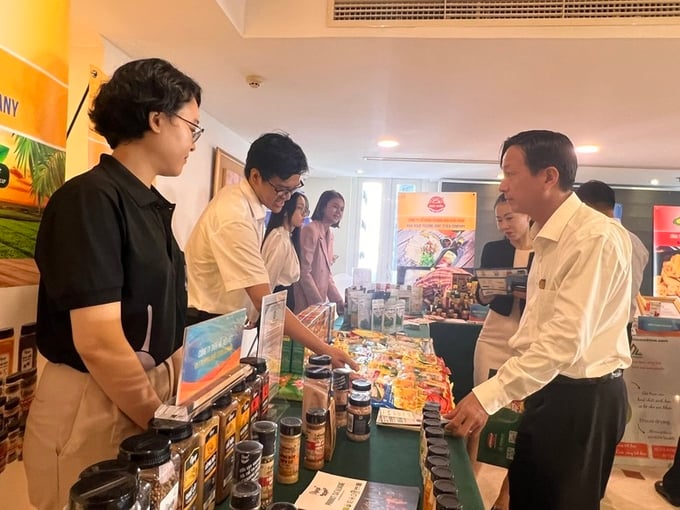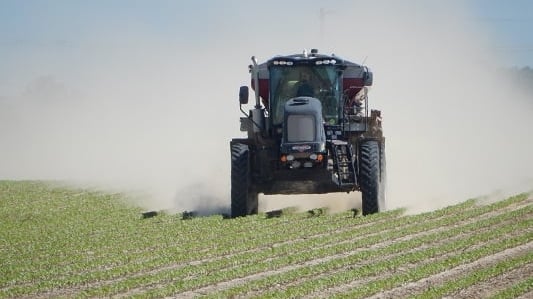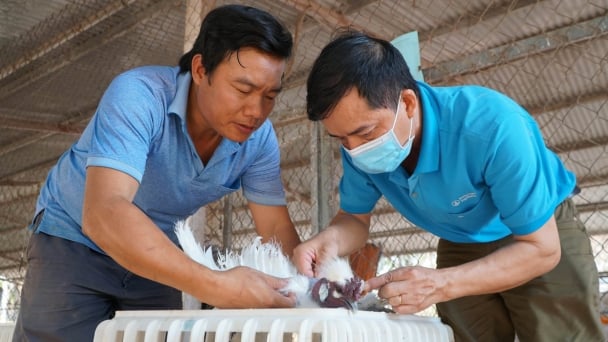May 17, 2025 | 13:30 GMT +7
May 17, 2025 | 13:30 GMT +7
Hotline: 0913.378.918
May 17, 2025 | 13:30 GMT +7
Hotline: 0913.378.918

Building brands, developing markets and promoting Halal products and services in Vietnam.
The Ministry of Science and Technology said that in Arabic, "Halal" means "permitted," and "Haram" is taboo. Muslims only use products authorized by God (Allah), which represents permission for the products to be certified Halal according to the Qur'an and Shari'ah Law. Halal products include almost all essential life products, such as food, beverages, organic foods, functional foods, pharmaceuticals, cosmetics, textiles, handicrafts, and other services, including banking, tourism, security, education and training, food services, hotels, and logistics.
Halal standards also aim at food safety and hygiene standards of many countries worldwide, which prohibit the use of substances, chemicals, and additives harmful to human health. In addition, the regulations and etiquette of Halal food processing are also very special. The strict regulations on food processing in Islamic law are standards of hygiene and safety and a judgment of Allah. Halal certification serves as a solid legal corridor to control raw materials and food processing processes for Muslims.
The consumer market for Halal products is distributed around the world, from Muslim to non-Muslim countries, from developed to developing economies, because Halal products meet many hygiene and safety criteria, ensuring the health, quality, green, clean, and ethical in processing, and contributing to environmental protection...
The scale of the global Halal economy reached USD 7,000 billion in 2022 and is expected to increase to about USD 10,000 billion in 2028 thanks to the growth of the Muslim population, spending levels, field diversity, and growth prospects in the future at a rate of about 6-8% per year.
Currently, in Vietnam as of June 2023, there were about 90,000 Muslims nationwide, of which Islam has over 36,000 followers, living concentrated in 14 provinces and cities, of which the majority are Muslims. most in An Giang Province, Ho Chi Minh City, Tay Ninh Province, and Ninh Thuan. There are 04 Islamic organizations recognized by the State. However, currently Vietnam only has about 20 export products in the Halal market.
Muslims love to travel and are among the group with the highest travel spending in the world. Vietnam tourism has the advantages of rich tourism resources, a suitable climate, and attractive tourism products, especially beach tourism and high-end resorts, suitable to the needs of incoming tourists. from Muslim countries.
In some of Vietnam's leading tourist destinations, such as Hanoi, Da Nang, Ho Chi Minh City, and some localities with Muslim communities, there are also a number of businesses interested in and investing in facilities, a service serving Muslim tourists. Some hotels have arranged prayer rooms and Halal menus for tourists.
Facing the increasing demand for using and exporting Halal products and services in the world in general and Vietnam in particular, the Ministry of Science and Technology has determined that Halal products and services are a general development trend and will grow rapidly in the coming time by ensuring the provision of better products for human health and society.
From the above practical situation, the research and promulgation of the Decree on the management of Halal products and services is a correct and necessary policy of the Government to promote the development of the Halal ecosystem in Vietnam, creating produce products with high-added value to serve domestic and foreign needs in the coming time.
The purpose of developing the Decree regulating the management of Halal products and services is to ensure compliance with the state management functions of ministries managing sectors and fields. Strict management of export, import, business, and certification of Halal products and services helps consumers feel secure when using, ensuring safe, quality, certified, and traceable products to the origin.
Encourage businesses to invest in producing and trading Halal products and services. Building brands, developing markets and promoting Halal products and services in Vietnam.
Strengthen training and international cooperation on Halal products and services; Improve capacity and promote the consumption of goods; develop products along the value chain from production to consumption. Strengthen propaganda and dissemination of Halal products and services; Raise awareness for businesses, producers, and consumers about strict compliance with Islamic Law regulations.
Currently, Halal certification organizations in Vietnam are not government agencies but private organizations that have been approved by Halal organizations around the world, such as GCC Accreditation Center (GAC), JAKIM (Malaysia), ESMA (UAE), CICOT (Thailand), MUIS (Singapore), KFDA (Korea),... recognize the function and authority of testing and issuing Halal certificates in Vietnam.
Translated by Huong Giang

(VAN) Hanoi People's Committee has issued a plan on reducing greenhouse gas emissions in the waste management sector with 2030 vision.

(VAN) Vietnam's draft amendment to Decree No. 156 proposes a mechanism for medicinal herb farming under forest canopies, linking economic development to population retention and the sustainable protection and development of forests.

(VAN) In reality, many craft village models combined with tourism in Son La have proven effective, bringing significant economic benefits to rural communities.

(VAN) The international conference titled Carbon Market: International experiences and recommendations for Vietnam was successfully held recently in Ho Chi Minh City.

(VAN) According to the Project on rearranging provincial and communal administrative units, in 2025, the country will have 34 provinces/cities, 3,321 communes, wards, and special zones, and no district-level organization.

(VAN) The vice president of fertilizer with Stone X Group says the Trump administration’s tariffs are impacting fertilizer markets.

(VAN) Resolution 57 offers Vietnam a significant opportunity to narrow the global genetic technology disparity and convert its extensive genetic resources into commercial advantages.